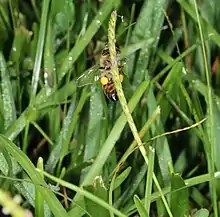Eremochloa ophiuroides
Eremochloa ophiuroides, or centipedegrass, is a species of grass in the family Poaceae. Used as a warm season lawn grass, it forms thick sods and spreads by stolons. It is medium to light green in color and has a coarse texture with short upright seedhead stems that grow to about 3-5 inches. Native to Southern China, it was introduced to the United States in 1916[1] and has since become one of the common grasses in the Southeastern United States and Hawaii. It can also be considered a weed.[2]
| Eremochloa ophiuroides | |
|---|---|
 | |
| Scientific classification | |
| Kingdom: | Plantae |
| Clade: | Tracheophytes |
| Clade: | Angiosperms |
| Clade: | Monocots |
| Clade: | Commelinids |
| Order: | Poales |
| Family: | Poaceae |
| Subfamily: | Panicoideae |
| Genus: | Eremochloa |
| Species: | E. ophiuroides |
| Binomial name | |
| Eremochloa ophiuroides (Munro) Hack. | |
Cultivation
Centipedegrass is a low maintenance grass.[3] It requires infrequent mowing.[4] Centipedegrass has medium shade tolerance and limited traffic tolerance.[1]
It is shallow rooted[3] and has poor drought tolerance.[1] Centipedegrass survives in mild climates without several hard freezes. With light freezes it will turn brown but recover and re-green as the temperature rises. It does well in sandy and acidic soils.[3] Centipede grass has low fertilization requirements.
References
- J. T. Brosnan and J. Deputy. "Centipedegrass." TM-14. College of Tropical Agriculture and Human Resources. University of Hawai‘i at Mānoa. March 2008. Retrieved 25 January 2023.
- "Weeds Identification App". weedid.cals.vt.edu.
- Richard L. Duble. "Turfgrass | SoilCrop.tamu.edu". Texas AgriLife Extension Service. Texas A&M System. Retrieved 25 January 2023.
- Aaron Patton and John Boyd. "Centipedegrass." FSA6120. University of Arkansas Division of Agriculture. (Archived on 23 March 2012.)
External links
- Centipede Lawns - The University of Georgia College of Agricultural & Environmental Sciences